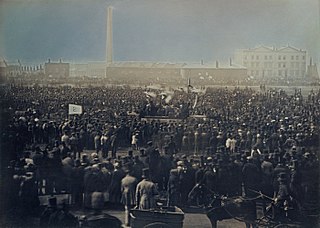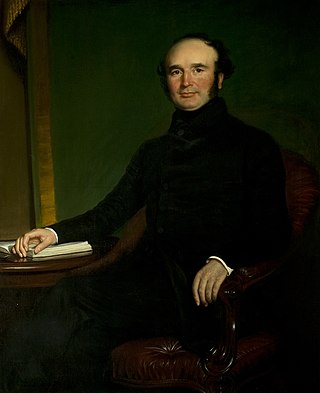Related Research Articles

The Liberal Party was one of the two major political parties in the United Kingdom, along with the Conservative Party, in the 19th and early 20th centuries. Beginning as an alliance of Whigs, free trade–supporting Peelites, and reformist Radicals in the 1850s, by the end of the 19th century, it had formed four governments under William Gladstone. Despite being divided over the issue of Irish Home Rule, the party returned to government in 1905 and won a landslide victory in the 1906 general election. Under prime ministers Henry Campbell-Bannerman (1905–1908) and H. H. Asquith (1908–1916), the Liberal Party passed reforms that created a basic welfare state. Although Asquith was the party leader, its dominant figure was David Lloyd George.

The Representation of the People Act 1832 was an Act of Parliament of the United Kingdom that introduced major changes to the electoral system of England and Wales. It reapportioned constituencies to address the unequal distribution of seats and expanded franchise by broadening and standardising the property qualifications to vote.

In the United Kingdom, the Edwardian era was a period in the early 20th century, that spanned the reign of King Edward VII from 1901 to 1910. It is commonly extended to the start of the First World War in 1914, during the early reign of King George V.

Chartism was a working-class movement for political reform in the United Kingdom that erupted from 1838 to 1857 and was strongest in 1839, 1842 and 1848. It took its name from the People's Charter of 1838 and was a national protest movement, with particular strongholds of support in Northern England, the East Midlands, the Staffordshire Potteries, the Black Country and the South Wales Valleys, where working people depended on single industries and were subject to wild swings in economic activity. Chartism was less strong in places, such as Bristol, that had more diversified economies. The movement was fiercely opposed by government authorities, who finally suppressed it.

Nonconformists were Protestant Christians who did not "conform" to the governance and usages of the state church in England, and in Wales until 1914, the Church of England.

The Anti–Corn Law League was a successful political movement in Great Britain aimed at the abolition of the unpopular Corn Laws, which protected landowners’ interests by levying taxes on imported wheat, thus raising the price of bread at a time when factory-owners were trying to cut wages. The League was a middle-class nationwide organisation that held many well-attended rallies on the premise that a crusade was needed to convince parliament to repeal the corn laws. Its long-term goals included the removal of feudal privileges, which it denounced as impeding progress, lowering economic well-being, and restricting freedom. The League played little role in the final act in 1846, when Sir Robert Peel led the successful battle for repeal. However, its experience provided a model that was widely adopted in Britain and other democratic nations to demonstrate the organisation of a political pressure group with the popular base.

The first MacDonald ministry of the United Kingdom lasted from January to November 1924. The Labour Party, under Ramsay MacDonald, had failed to win the general election of December 1923, with 191 seats, although the combined Opposition tally exceeded that of the Conservative government, creating a hung parliament. Stanley Baldwin remained in office until January 1924.

Radicalism was a political movement representing the leftward flank of liberalism between the late 18th and early 20th century. Certain aspects of the movement were precursors to modern-day movements such as social liberalism, social democracy, civil libertarianism, and modern progressivism. This ideology is commonly referred to as "radicalism" but is sometimes referred to as radical liberalism, or classical radicalism, to distinguish it from radical politics. Its earliest beginnings are to be found during the English Civil War with the Levellers and later the Radical Whigs.

The "unreformed House of Commons" is a name given to the House of Commons of Great Britain before it was reformed by the Reform Act 1832, the Irish Reform Act 1832, and the Scottish Reform Act 1832.
Forty-shilling freeholders were those who had the parliamentary franchise to vote by virtue of possessing freehold property, or lands held directly of the king, of an annual rent of at least forty shillings, clear of all charges.

The Working Men's Club and Institute Union is a voluntary association of private members' clubs in Great Britain & Northern Ireland, with about 1,800 associate clubs. One club in the Republic of Ireland, the City of Dublin Working Men's Club is also affiliated. Most social clubs are affiliated to the CIU.
The History of Australia (1851–1900) refers to the history of the people of the Australian continent during the 50-year period which preceded the foundation of the Commonwealth of Australia in 1901.
Merioneth, sometimes called Merionethshire, was a constituency in North Wales established in 1542, which returned one Member of Parliament (MP) to the House of Commons of the English Parliament, and later to the Parliament of Great Britain and of the United Kingdom. It was abolished for the 1983 general election, when it was largely replaced by the new constituency of Meirionnydd Nant Conwy.
Surrey was a constituency of the House of Commons of the Parliament of England, then of the Parliament of Great Britain from 1707 to 1800 and of the Parliament of the United Kingdom from 1801 to 1832. It was represented by two Members of Parliament until 1832.

A movement to fight for women's right to vote in the United Kingdom finally succeeded through acts of Parliament in 1918 and 1928. It became a national movement in the Victorian era. Women were not explicitly banned from voting in Great Britain until the Reform Act 1832 and the Municipal Corporations Act 1835. In 1872 the fight for women's suffrage became a national movement with the formation of the National Society for Women's Suffrage and later the more influential National Union of Women's Suffrage Societies (NUWSS). As well as in England, women's suffrage movements in Wales, Scotland and other parts of the United Kingdom gained momentum. The movements shifted sentiments in favour of woman suffrage by 1906. It was at this point that the militant campaign began with the formation of the Women's Social and Political Union (WSPU).

James Macpherson Grant was an Australian solicitor who defended the Eureka Stockade rebels and a politician who was a member of the Victorian Legislative Assembly and the Victorian Legislative Council.

The Suffolk Building Society is a UK building society based in Ipswich, Suffolk. It is a member of the Building Societies Association.
The Manchester Observer was a short-lived non-conformist Liberal newspaper based in Manchester, England. Its radical agenda led to an invitation to Henry "Orator" Hunt to speak at a public meeting in Manchester, which subsequently led to the Peterloo Massacre and the shutdown of the newspaper.

Women's suffrage in Wales has historically been marginalised due to the prominence of societies and political groups in England which led the reform for women throughout the United Kingdom. Due to differing social structures and a heavily industrialised working-class society, the growth of a national movement in Wales grew but then stuttered in the late nineteenth century in comparison with that of England. Nevertheless, distinct Welsh groups and individuals rose to prominence and were vocal in the rise of suffrage in Wales and the rest of Great Britain.

John Biggs was a British hosier and Liberal and Radical politician.
References
- ↑ Beggs, Thomas (1853). "Freehold Land Societies" (PDF). Journal of the Statistical Society of London. 16/4: 338–346.
- ↑ Dyos, H J (1961). Victorian suburb: a study of the growth of Camberwell. Leicester: Leicester University Press. pp. 114–122.
- ↑ Chase, Malcolm (1991). "Out of Radicalism: The Mid-Victorian Freehold Land Movement". The English Historical Review. 106/419: 319–345.